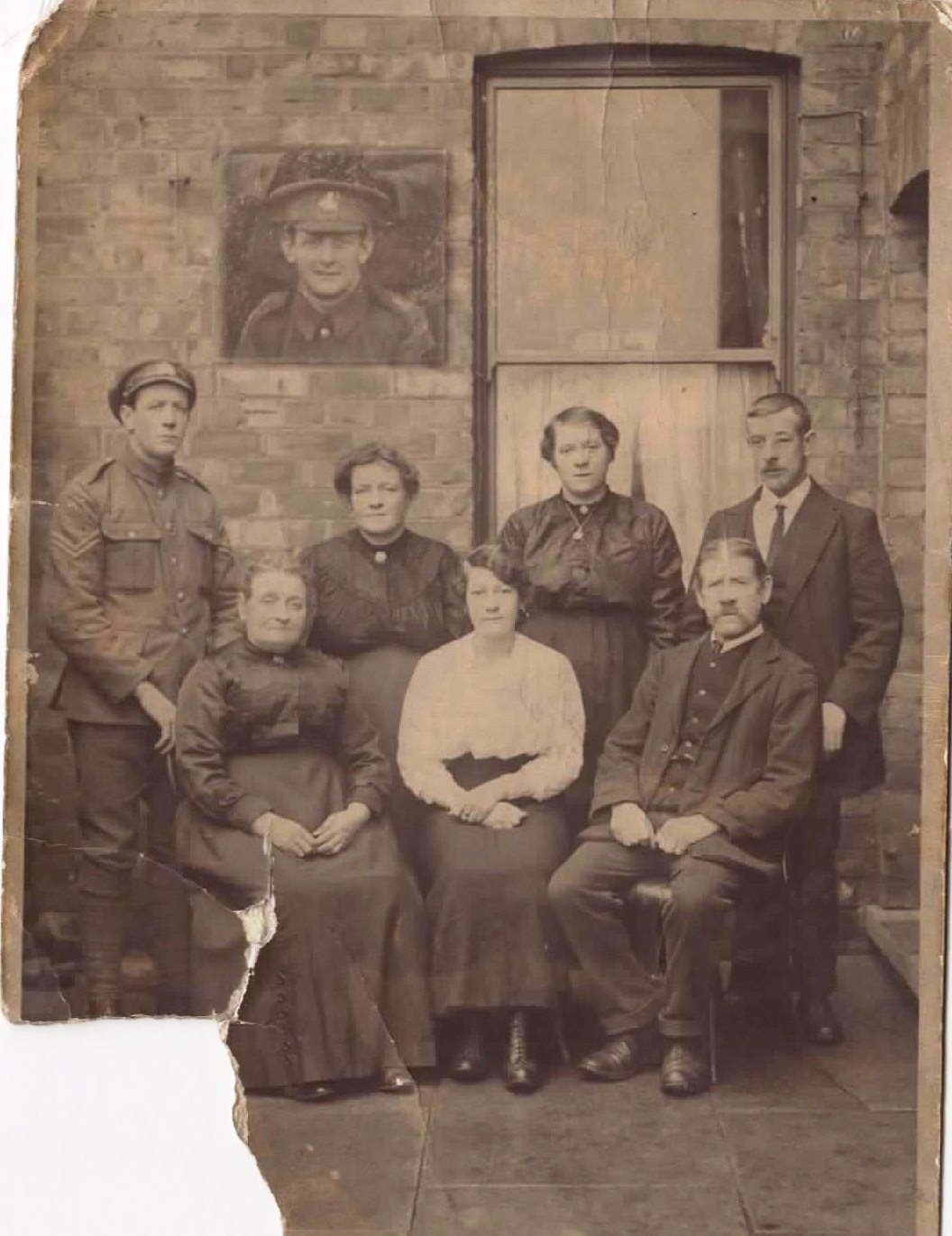
Submitted by Angela Atkinson.
L/Sgt Joseph (Joe) Taylor – shown in the picture on the wall – served in 4th Battalion Yorkshire Regiment. Joe was my Grandad’s brother, born in 1887. Joseph worked as a length man on the North Eastern Railway before the war.
He was killed in action on 25/4/1915. He is commemorated at Ypres and on the Lych Gate in Brompton, Northallerton.
His parents were my great grandparents and I believe the others on the photo are all his family.
The other person in uniform is William Robert (Bill) Taylor, who was born in 1883.
Captain Stead wrote to Taylor’s family:-
“Sergeant Taylor, along with his Company Commander, Major Matthews, were the first of their battalion to fall for their Country. His rapid promotion shows the confidence that was placed in him.
He was an excellent soldier and a brave man.”
Explore more memories from the ribbon
-
Corporal Tommy Edwards
Steven Shackleton told us about his great uncle, Thomas Edwards from Ironbridge. During the First World War, Tommy Edwards was a Corporal in the King’s Own Yorkshire Light Infantry. Prior to the war he had served as 86589 Pte T Edwards with the Territorial Reserve Battalion. He served with the 10th KOYLI and then transfered to the 2nd KOYLI before he was killed in action on 30th September 1918, aged 19. He is buried at Bellicourt British Cemetery in France. His mother was Mrs Francis Edwards of Hoylake, Cheshire and had the following inscription added to the bottom of his headstone: ‘Peace, perfect peace’.
-
Private Percy Raworth
Percy Raworth was Judith Farrar’s grandfather’s cousin, she visited the museum to tell us his story. Percy Raworth was born in 1890 and attended Elmfield College in York. His father William ran a local building firm, and later became a local Councillor in Harrogate. By 1911 Percy was a Joiners’ apprentice and well on the way to joining the family firm. His career seems to have taken a side track as he was working as a ‘Stock Keeper’ at his brother-in-laws leather warehouse at Rushden, Northamptonshire when he enlisted. Originally a member of the Machine Gun Corps, Percy went on to serve with the Tank Corps, specifically, ‘D’ Brigade and win the Military Medal. The Rushden Echo of 10th November 1916 notes that he: Has been in action several times with the ‘Tanks’, once he was four hours under fire digging the ‘Tank’ out of a German dug-out into which it has sunk. On another occasion the ‘Tank’ caught fire, and Private Raworth and his driver got the military medal.’ Percy died on 23rd September 1917 of wounds he received during a German air raid. It seems that his tank again became grounded and whilst Percy was digging it out German aircraft attacked. Capt. F. A. Robinson wrote to Percy’s father: ‘…he was struck by an enemy bomb. He was made as comfortable as humanly possible under the circumstances, and you will doubtless find some consolation in the knowledge that he did not appear to feel very much pain……our experiences…
-
William Bowman
Not much is known about the service of Sergeant William Bowman of the Yorkshire Regiment. However, Stuart Hodgson a volunteer at the Green Howards Museum noticed something slightly unusual when he came across a photograph of William. The second button on his tunic is covered in black material. There is a good deal of evidence which suggests that some soldiers who had lost relatives during the war started wearing a black button on their tunic, or sometimes a button wrapped in black crepe. This was probably an un-official practice and a blind eye was turned. However, evidence in an Eastern Command Order (1593) of August 1918 states: “Mourning wearing of, by Non-Commissioned Officers and men. The practice by Non-Commissioned Officers and men of covering the second button of the service dress jacket with black material as a symbol of mourning is irregular and will cease forthwith. (War Office Letter No. 54/ Gen No./3025 (QMG 7) dated 19th July 1918)” We do not know who was being mourned, but it appears that William Bowman survived the Great War.
